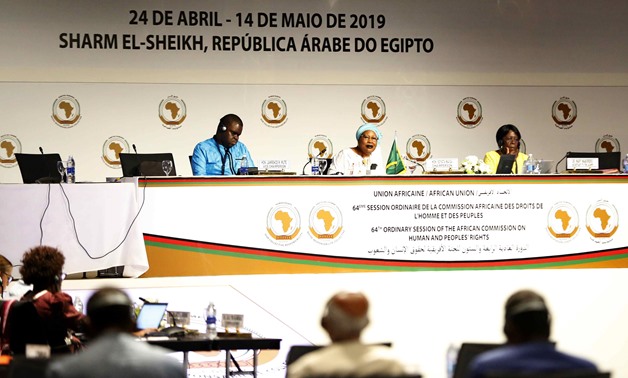
Session on human rights situation in Africa on the fourth day of the 64th Ordinary Session of the African Commission on Human and Peoples’ Rights (ACHPR) held in Sharm El Sheikh, Egypt. April 27, 2019. EgyptToday/Maher Eskandar
CAIRO - 27 April 2019: Discussions on human rights situation in Africa persisted on the fourth day of the 64th Ordinary Session of the African Commission on Human and Peoples’ Rights (ACHPR) held in Egypt’s Sharm El Sheikh on April 24 - May 14.
In a panel discussion on NGOs’ observation of prisons as a means to prevent torture, the Cameroon delegation refuted allegations against senior state officials. The delegates called upon participants to condemn the bad content of the communication sent by the ACHPR and that tarnishes the image of Cameroon saying such content is not acceptable.
The delegation stated that the Cameroon people will not be influenced by those who want to cause political pointless debates, and that the government is ready to hold inclusive dialogues among the people. The delegates added that human rights are one of the noble goals the government is eager to achieve.
On the other hand, the ACHPR representative affirmed that the Commission follows with ultimate concern the events taking place in some parts of Cameroon adding that the Commission had sent many calls and waiting for a response. The ACHPR representative added that the Commission will visit Cameroon whenever there is a chance.
Conflict has been ongoing in the English-speaking Northwest and Southwest parts of Cameroon since late 2016 “leaving 1.3 million people in need of aid” and causing the displacement of half a million people from their homes, according to Africa News.
The Tanzanian delegation stated that the country has a media law that ensures professionalism. The delegates added that Tanzania has a number of media outlets embodied in 20 magazines, 20 broadcast stations, two state-owned newspapers and two state-owned TV networks. The delegation affirmed that all means of justice are available for Tanzanian citizens.
The representatives of Kenya stipulated that the country is a democracy where human rights are reinforced and law is abided by in all measures. The delegation underlined that all murder cases are considered by courts such as the case of the six-month baby girl which was decided in February. The delegation added that measures have been taken to make laws compatible with human rights requirements after holding social dialogue with concerned parties.
As reported by the Voice of America, a judge in Kenya ruled that five anti-riot police commanders "culpable" for the death of the baby in 2017 as the forces stormed into the house of her parents and hit her hard on the head. The baby died while receiving medical treatment. The incident occurred Western Kenya where they were facing protests against the result of presidential election. The judge ordered the investigation of other 31 officers who may be linked to the crime.
The ACHPR was launched on November 2, 1987 in Addis Ababa. However, its secretariat is located Gambia’s capital, Banjul. “The Commission consists of 11 members elected by the AU Assembly from experts nominated by the State Parties to the Charter. Their mandates are for six years, renewable,” the Commission’s website reads.
The Commission has three major functions: the protection of human and peoples' rights, the promotion of human and peoples' rights, and the interpretation of the African Charter on Human and Peoples' Rights. That is in addition to any other tasks assigned by the Assembly of Heads of State and Government.

Comments
Leave a Comment